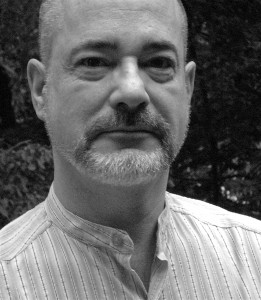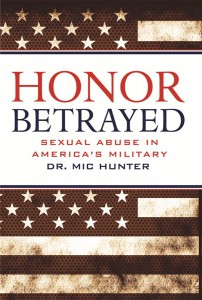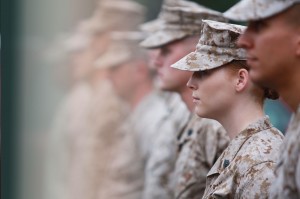Military Sexual Abuse – An Interview with HONOR BETRAYED Author Dr. Mic Hunter
By Eveline Morel | July 18th, 2013 | Category: Interviews, L.A. Art & Culture | 2 comments I met Dr. Mic Hunter at a recent event hosted by Shari Belafonte, benefiting the Military Rape Crisis Center. The event also marked the launch of the documentary Women of War, a disturbing expose of the alarmingly high statistics of sexual assault in the military, produced by the award-winning filmmakers of the 2009 documentary Who Will Stand. This subject, no stranger to the news in recent weeks, has been under discussion at all government levels. Most recently the House passed a defense bill that includes punishment measures for military rape.
I met Dr. Mic Hunter at a recent event hosted by Shari Belafonte, benefiting the Military Rape Crisis Center. The event also marked the launch of the documentary Women of War, a disturbing expose of the alarmingly high statistics of sexual assault in the military, produced by the award-winning filmmakers of the 2009 documentary Who Will Stand. This subject, no stranger to the news in recent weeks, has been under discussion at all government levels. Most recently the House passed a defense bill that includes punishment measures for military rape.
Will this be enough, one asks, to create the necessary change?
As author of the book Abused Boys: The Neglected Victims of Sexual Abuse, published in 2005, Dr. Mic Hunter, a licensed psychologist and marriage and family therapist, is no stranger to controversial, best-left-alone subjects. In Honor Betrayed he explores the cultural causes of military sexual abuse and provides some practical recommendations.
I talked with Dr. Hunter at length about the book, his extensive research into the subject matter, and the impetus for change. His remarks were thoughtful and impartial, showing the depth of his understanding of the issues involved, and society at large.
EM: What impact did your first book, Abused Boys: The Neglected Victims of Sexual Abuse have? What significant changes did it engender? What results do you hope your current book will create?
Dr. Hunter: In 1989 I contacted about one hundred publishers about Abused Boys. They told me that the sexual abuse of boys was “rare” and even in those cases where it did occur, the experience “didn’t harm boys the way girls are hurt.” Now, it is common knowledge that 1 in 6 boys experience sexual abuse and that it damages them in ways nearly identical to the negative effects shown by girls.
In 2006, I contacted one hundred publishers about Honor Betrayed. The reaction was exactly the same; I was told sexual abuse in the military is rare, and that it “doesn’t negatively affect veterans the way it harms civilians.” Of course both of these claims are false. It has been my hope that Honor Betrayed would help raise awareness of the problem of sexual abuse in the military and lead to meaningful change, in the same way that Abused Boys led to the founding of organizations such as MaleSurvivor.org and to more boys and men seeking treatment.
I think the increase in the awareness of boys being molested led to more attention being paid to the fact that men are sexually assaulted, and that has led to male victims being mentioned when discussing sexual assault in the military. I foresee a time in the near future when the general public is so outraged concerning sexual abuse in the military that they demand that politicians take meaningful action so that the military is forced to change.
 In Honor Betrayed I compare the problems related to the integration of African Americans into the military with those of assimilating women into the ranks. The military has done well in terms of race relations; it can learn from this success and apply those lessons to the problem of sexual abuse.
In Honor Betrayed I compare the problems related to the integration of African Americans into the military with those of assimilating women into the ranks. The military has done well in terms of race relations; it can learn from this success and apply those lessons to the problem of sexual abuse.
EM: How has Honor Betrayed been received by the military establishment? What has been the reaction?
Dr. Hunter: The active military, the Veterans Administration, and the media have ignored, the book, for the most part, when it was published in 2007. Not only was I not hired to provide training, my offers to do workshops at no charge were declined. This was very different than the reaction of the civilian world when Abused Boys was published: for two years after its release I was speaking all over the country, and being interviewed for the print and broadcast media.
Although I have been interviewed a few times, what has usually happened is that editors or producers tell the reporters that the topic of sexual abuse in the military “isn’t newsworthy” or “undermines support for the military” or “is bad for troop morale.” It is only recently that the topic has gotten any attention in the media, and this has been the result primarily of those who survived sexual assault while serving. Now there are numerous websites dedicated to raising awareness on the issue.
EM: If “rape and pillage” has been historically associated with the business of war, how can this change without denying the whole underlying purpose of the military whose primary function is to “deal in death” and who relies on death and violence to do its work?
Dr. Hunter: Over time the view of what is appropriate behavior in war has changed. We now have courts for war crimes, and crimes against humanity. Our military has rules of engagement as opposed to “kill anything that moves and destroy anything of value.” Soldiers are no longer rewarded for victory by taking women and children as their slaves.
Furthermore, in the past rape as a weapon of war, and as a spoil of war, was perpetrated against the enemy. Victorious armies raped their enemies, male and female, to shame and punish them. The type of rape addressed in Honor Betrayed is the rape of one’s own comrade. A military that attacks its own personnel can’t be effective.
EM: Essentially, we’re talking about a cultural change here—how possible is this, and how long will it take? How many generations?
 Dr. Hunter: It is possible for even rigid systems like the military to change, but the motivation for that transformation will at first have to come from outside the organization. In America the military is supposed to answer to the civilian government, and the government is supposed to answer to the people. Therefore, unless the general population, the people who vote, demand a change in the military, nothing meaningful will occur. As leadership positions are filled by younger personal, we have already seen the issue of gays serving in the military as becoming less and less of an issue. It is my hope that over the next ten years a similar shift in attitude away from tolerating sexual abuse in the military will occur.
Dr. Hunter: It is possible for even rigid systems like the military to change, but the motivation for that transformation will at first have to come from outside the organization. In America the military is supposed to answer to the civilian government, and the government is supposed to answer to the people. Therefore, unless the general population, the people who vote, demand a change in the military, nothing meaningful will occur. As leadership positions are filled by younger personal, we have already seen the issue of gays serving in the military as becoming less and less of an issue. It is my hope that over the next ten years a similar shift in attitude away from tolerating sexual abuse in the military will occur.
EM: Given the violence that kids are being exposed to in video games and TV, and the continued objectification of women, is there any hope that future generations will change?
Dr. Hunter: Whatever one practices one becomes skilled at. A person who spends his time engaged in activities that glorify violence and objectifies women will develop attitudes consistent with these behaviors. If we want children to think differently, then we have to behave differently; adults ought to stop spending their time and money on activities that venerate violence and sexual objectification. Just look at a list of movies that are available, and you’ll see how the majority of them involve watching killing. When violence is a major form of recreation, it only follows that violence will occur in reality in our families, schools, sports teams, and other organizations.
EM: Is the social role of women as nurturers and life-givers endangered by having women in combat situations alongside men?
Dr. Hunter: Yes, but then again, putting anyone, male or female, in a combat situation puts one at great risk of psychological damage. Killing another human being is not as psychologically/ morally easy as movies and video games would have us believe. Witnessing the wounding and death of comrades affects both men and women. The fact is, given the reality of an all-volunteer military and the type of conflicts our military is deployed in, there is no front line, and anyone serving in a combat zone is at risk. We have had Marines killed in their barracks, and sailors killed on board ship while in port, by bombs delivered by car and by boat. Military personnel are going to be in harm’s way. We will have bodies come back in coffins, and some of those will be women.
EM: If 1 in 3 women are sexually abused in the military, wouldn’t they be better off working in another field where they would be safer?
Dr. Hunter: Eliminating women from the ranks would only decrease the prevalence of the sexual assault of females. There would still be rape in the military. Searches of personnel records have found evidence of sexual assault victimization in 1 in 100 men serving in our armed forces. We have an all-volunteer military, and if people refuse to enlist because of their fear of being sexually assaulted, the military will have to do something or lose its pool of personnel.
EM: What measures do you think would be most effective in reducing and/or eliminating sexual abuse in the military?
Dr. Hunter: Keep the prosecution of those accused of sex crimes out of the hands of base commanders. As it is now, it is easy for them to unilaterally drop charges, and even convictions, if it suits them. What message does it send the victim, her or his family, other members of the military, and the wider society when a commander with the stroke of a pen declares, “Yes, a military court believed you were raped and found the defendant guilty, but none of that matters. In effect you don’t matter.” Furthermore, stop allowing convicted sex offenders to be honorably discharged. Equally important, open all responsibilities to women and set a single standard that anyone, regardless of sex, has to meet in order to qualify for a job. This would go a long way towards reducing the idea that women are merely support staff for the “real” (read men) military.









Dr. Hunter has rendered a very significant service with his research on sexual abuse in the military. By documenting sexual abuse, he has given voice to a concern that, at its core, silences victims, disables the power of institutions to examine the problem, and empowers a culture of violence that goes way beyond actual combat experiences. His book is well researched, thoughtfully written, and disturbingly provocative by putting this issue front and center. It sheds light on the growing awareness of mental illness issues, particularly PTSD and suicides in the military. As a Clinical Psychologist, I have personally had several clients who were victims of sexual abuse in the military and have witnessed the erosion of trust experienced by courageous warriors who felt betrayed by the military and country they were committed to serve. Thank you, Dr. Hunter!
Thanks for posting on this topic.